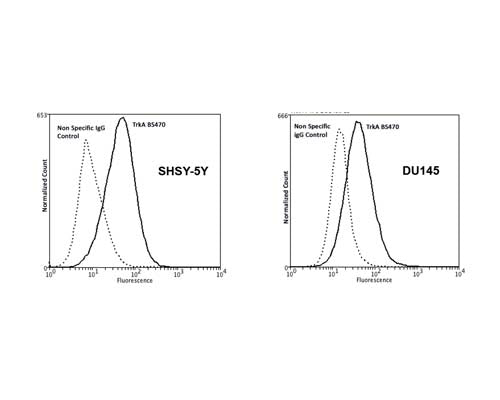Anti-Tyrosine Kinase Receptor A (TrkA) Antibody (BS470)
Our Anti-Tyrosine Kinase Receptor A (TrkA) mouse monoclonal primary antibody detects human Tyrosine Kinase Receptor A (TrkA), and is IgG. It is validated for use in FC, ICC.



TrkA expression on non-permeabilized human SHSY-5Y neuroblastoma and DU145 prostate cancer cell lines analysed by Flow Cytometry. Blocking: 200 µg/mL normal sheep IgG (30 minutes) on ice. Primary antibody: Mouse Monoclonal antibody to TrkA, extracellular domain (cat # M-1723-100, 2 μg per ~106 cells) for 30 minutes on ice. Secondary antibody: Goat anti-mouse PE (1:100 dilution, 20 min in dark on ice. Non-specific Control IgG, clone X63 (cat# M-1249-100) was used as negative control under same conditions (black dashed). Flow cytometry data and results were generated using Orflo Moxiflow™ instrument and protocols.
Click on image to zoom
SKU: M-1723-100
Ships: 1-2 business days
Product Details
Tyrosine Kinase Receptor A (TrkA)
TrkA is a member of the neurotrophic tyrosine kinase receptor family. It is a membrane-bound receptor that upon neurotrophin binding, phosphorylates itself and members of the MAPK pathway. TrkA is required for high-affinity binding to nerve growth factor (NGF), neurotrophin-3 and neurotrophin-4/5 but not brain-derived neurotrophic factor (BDNF). TrkA leads to cell differentiations and may play a role in specifying sensory neuron subtypes. It has a crucial role in the development and function of the nociceptive reception system as well as establishment of thermal regulation via sweating. SUBUNIT: Exists in a dynamic equilibrium between monomeric (low affinity) and dimeric (high affinity) structures. SUBCELLULAR LOCATION: Cell membrane; single-pass type I membrane protein. Endocytosed to the endosomes upon treatment of cells with NGF. ALTERNATIVE PRODUCTS: 2 named isoforms produced by alternative splicing. Both isoforms have similar biological properties. TISSUE SPECIFICITY: Isoform TrkA-II is primarily expressed in neuronal cells. Isoform TrkA-I is found in non-neuronal tissues. Mutations in TrkA have been associated with congenital insensitivity to pain, anhidrosis, self-mutalating behaviour, mental retardation and cancer (Reference: www.uniprot.com).
IgG
Monoclonal
BS470
Flow, ICC
Mouse
A synthetic peptide from the extracellular domain of human TrkA (C-SATVMKSGGLPS, aa: 235-246) has been used as the immunogen.
Human
Human
Spin vial briefly before opening. Reconstitute in 100 µL sterile-filtered, ultrapure water. Centrifuge to remove any insoluble material. Final buffer contains no preservatives.After reconstitution divide into aliquots and store at -20°C for a higher stability. Antibody contains no preservatives. Store at 2-8°C with an appropriate antibacterial agent. Use sterile methods. Highest purity Glycerol (1:1) may be added for an additional stability when stored at refrigerated or freezing temperatures. Avoid repetitive freeze/thaw cycles.
Lyophilized
Protein G purified mouse immunoglobulin
Lyophilized from PBS, pH 7.4, containing 3% trehalose without preservatives.
ICC: 1-5 µg/mL
Flow cytometry: 20 µg/mL.
Flow cytometry data and immunofluorescence staining of TrkA (extracellular domain) receptor in SHSY-5Y cells has shown that detection of TrkA expression depends on its cellular localization (membrane vs. internal stores). Thus, permeabilization of cells may be required, despite that clone BS470 was raised against the extracellular domain of TrkA.
Other applications not yet tested.
Flow cytometry data and immunofluorescence staining of TrkA (extracellular domain) receptor in SHSY-5Y cells has shown that detection of TrkA expression depends on its cellular localization (membrane vs. internal stores). Thus, permeabilization of cells may be required, despite that clone BS470 was raised against the extracellular domain of TrkA.
Other applications not yet tested.
Unconjugated
TrkA. Does not cross-react with TrkB or TrkC. Reacts with human TrkA. While not tested yet, M-1723-100 is not expected to react with TrkA from other species due to amino acid sequence dissimilarity.
For research use only.
United States
12 months after date of receipt (unopened vial).
Tropomyosin-related kinase receptor; High affinity nerve growth factor receptor; Neurotrophic tyrosine kinase receptor type 1; TRK1 transforming tyrosine kinase protein; p140-TrkA; Trk-A; NTRK1; TRK
25°C (ambient)


